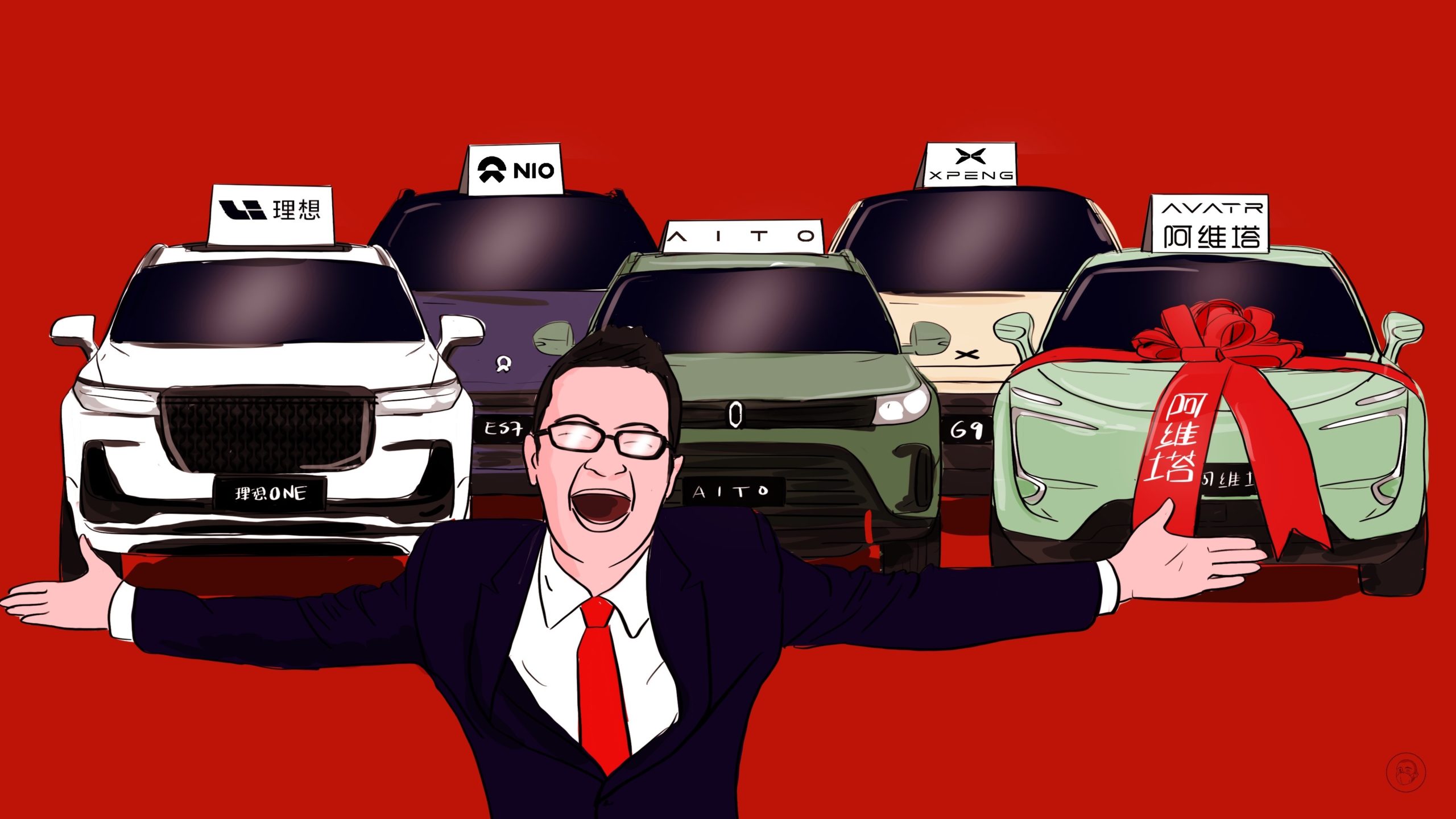Chinese luxury electric cars are truly world class, and there’s a new one
China’s electric vehicles are competing directly with the best foreign cars, and a new company with an extraordinary pedigree has entered the market.

On Monday, Avatr 阿维塔, a new luxury electric car brand, launched in China. Avatr is a joint venture between the world’s leading electric car battery company, CATL 宁德时代, Chang’an Automobile 长安汽车 a state-owned giant founded in 1862, and Huawei 华为, China’s leading telecommunications company. (Electric vehicle brand NIO 蔚来汽车 was also originally involved, but withdrew from the project in 2020.)
The fully electric SUV Avatr 11 comes in three models, and is the first vehicle to be fully equipped with Huawei technology, including its DriveONE dual-motor four-wheel drive system, the AVATRANS intelligent piloting system, and the ADS automatic parking system. The three models are equipped with CATL batteries with ranges between 555 kilometers (344 miles) and 680 kilometers (422 miles), and will retail for 349,900 yuan ($51,892) to 409,900 yuan ($60,790).
China’s EVs are truly world class
As the product of three highly competitive brands, the Avatr 11 has a unique selling point. But Avatr has joined what is now fast becoming a crowded new market of electric SUVs in China: In the last few months, a range of new domestic models has been launched, including the ES7 from NIO, the L9 from Li 理想, the M7 from AITO 问界, and the G9 from XPeng 小鹏.
The makers of these new Chinese electric SUVs are openly comparing and benchmarking their vehicles with the leading foreign luxury SUV models, notably the BMW X3, the Mercedes-Benz GLS, and the Rolls-Royce Cullinan. At the launch of the Li L9, for example, CEO Lǐ Xiǎng 李想 stated, “We are not afraid at all of the Rolls-Royce Cullinan,” and the CEO of XPeng, Hé Xiǎopéng 何小鹏, compared the XPeng G9 with the Porsche Cayenne.
In fact, with a price tag of around 400,000 yuan ($59,322), the Avatr 11 is competing directly with luxury German brands that have more than a century of history, including the BMW iX3 and the Mercedes-Benz EQC, which both retail for around the same price.
There is one simple reason for this confidence of China’s electric vehicle (EV) brands: The rapid rise of the EV market and the newness of the technology has created a level playing field for luxury electric SUVs. This confidence is not misplaced: The intelligent driving systems of the new Chinese SUVs, like the XPILOT 4.0 system in the XPeng G9, are considered to be more advanced than the driving systems of foreign models like the Audi e-tron.
Tax breaks and cheap electricity
July and August, the hottest months of the year, have traditionally comprised the off-season for the car industry. But this is no longer the case, thanks to electric vehicles.
On Tuesday, the China Passenger Car Association (CPCA) reported that, on the back of big reductions (or full exemptions for new energy vehicles, or NEVs, most of which are electric) of vehicle purchase taxes, total retail sales of passenger cars in July were 1.818 million units, a year-on-year increase of 20.4%.
- NEV sales in July were 564,000 units, a year-on-year increase of 123.7%.
- The CPCA is anticipating sales of around 600,000 NEV units per month from August to December, and total sales of 6.5 million units this year.
In addition to policy support, EV sales are also benefiting greatly from the low price of electricity for private residents. According to a local report, in 2019, the price of electricity for residents in China was the second lowest among 28 countries with available data, with an average price of 0.54 yuan ($0.08) per kilowatt-hour (kWh). (The average residential electricity rate in the U.S. is about $0.15 per kWh, and in Germany about $0.33 per kWh.)
But not all of these incentives for Chinese drivers to buy electric cars will last forever. According to the CPCA, in July, the domestic retail penetration rate of NEVs was 26.7%, an increase of 11.9 percentage points from 14.8% in July 2021. A State Council meeting on July 29 affirmed the policy of full exemption of NEV purchase taxes, which will likely continue through most of 2023. However, according to one industry expert, when the NEV penetration rate exceeds 35%, the government may start to cut back (and eventually cancel) the tax exemptions, which may put a significant break on sales, especially in the luxury sector.
Batteries on fire and other safety problems
China’s NEV manufacturers have some more immediate concerns brought about by teething problems with the advanced software and batteries. In 2019, a Tesla Model S in a Shanghai basement spontaneously ignited, reportedly due to poor ventilation. A journalist who visited EV dealerships in Shanghai reported this week that customers are paying particular attention to battery safety. There are also still many residential areas in China that do not permit EV owners to install charging piles in their properties, on the grounds of safety.
Indeed, according to the Ministry of Emergency Management, in the first quarter of this year, there were 640 fire accidents in China related to EVs, a year-on-year increase of 32% (or an average of seven fires every day of the year). This was much higher than the average increase in non-electric vehicle fires (8.8%). Most of the fires were caused by aging battery components, or when batteries ignited at times of collisions.
There are also teething problems with the reliability and safety of the electronic systems on EVs, and concerns about their vulnerability to cyber attacks: In January this year, for example, a German teenager claimed to have hacked over 25 Teslas from around the world via security bugs in Tesla’s open source logging tool.
Autonomous and assisted driving systems are also causing problems: Just yesterday, a fatal car accident occurred on a highway near the eastern Chinese city of Ningbo, when an XPeng P7, using its Lane Centering Assist function, smashed into a broken-down vehicle.
A new Chinese definition of luxury
For now, however, China’s EVs are on a high and a roll. On the new level playing field of fully electric vehicles, Chinese manufacturers are defining their own new era of luxury with innovative driving technology (like that produced by Huawei) and highly competitive cars and batteries (produced by CATL), and are competing with — and excelling at — the standards of luxury hitherto provided only by foreign car brands.






